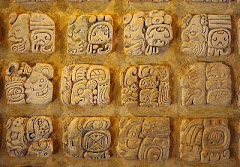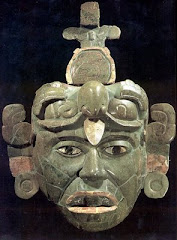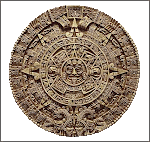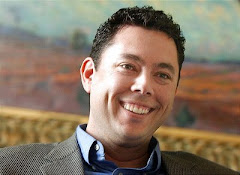
Editor's Note: The Top of the Morning staff is pleased to publish this David G. Woolley post demonstrating the powerful clarifying nature of the Book of Mormon as a companion text to the Bible. As prophesied by Ezekiel, the two scriptures go hand in hand.
It seems that way, sometimes. Take the idea of perfection. Isn’t that our mission in life? Aren’t we supposed to be seeking it?
Likely not.
Perfection is an odd term. Its completely foreign to the teachings of Christ, yet there it is in the English translation of the New Testament, Matthew 5:48. In the Hebrew text the term perfect actually means complete or mature. It comes from the Hebrew word Tam or Tamim. When Christ admonished the Jews to be perfect he was likely asking them to be complete. But without the clarifying passages of the Book of Mormon account of Christ's ministry, the translators of the Bible can be forgiven for their imperfect translation.
In the Old World, instead of using himself as the example of perfection, Christ used His Father. Christ was without blemish. Sinless. Flawless. In Hebrew He is the Messiah. In Greek He is known as the Christ. In English he is the Anointed One. Anointed and set apart to become the savior of mankind. That was the major focus in Christ's mission on earth. Providing salvation for us. So why didn’t He use Himself as the living, breathing incarnation of perfection? In the English sense of the word He was perfect. In the Hebrew text He was incomplete.
When Christ delivered the Sermon on the Mount he was the only flawless man to ever walk the earth. He'd received a mortal body of flesh. He'd suffered temptation at the hands of Satan and won in perfect form. He'd healed the sick, made the lame to walk, and raised the dead. Despite all he’d accomplished his mission was unfinished. The pain and anguish of an impending atonement loomed. There was a resurrection to work out. An ascension to make. There were other sheep not of the Jerusalem fold he had yet to gather. His mission was far from over. Instead of presenting Himself as an incomplete example, He used His Father as the perfectly complete illustration, telling the Jews to, "Be ye therefore [complete] even as your father which is in heaven is [complete] (Matthew 5:48).
The term perfect is succinct. It’s to the point. The only problem is that we understand the idea in absolute terms. To English speakers the word means without flaw. Without error. No nicks. No scratches. No bumps. No imperfections. Brand new. Never used. Showroom quality. Leather seats. Fully functional GPS. All the extras hand crafted to perfection.
How impossible is that?
The whole idea of perfection denies the necessity of the atonement. What need have we of a Savior if we are without flaw? Without nicks? Without scrapes, bumps or imperfections? What good is a plan for our salvation if we've got the newest model, the leather seats, and the fully functional GPS? With all that, can't we find our own way?
And then, as if the concept of perfection couldn't get anymore blurred, we get it all mixed up with the idea of acquiring the talents of others. Talents are like manna from heaven. Nourishing. Sustaining. Filling. You can also harvest too much of a good thing. Talents were never intended to be harvested. They're a gift. Given to us to bless others. The talents we lack are not a measure of our imperfection. They're an invitation for others to serve us.
The Lord was pretty clear on the matter (D&C 46:11-33). Talents have little or possibly nothing to do with the perfection (completeness) Christ preached in the Sermon on the Mount. We were never intended to possess every talent. We are expected to bless one another with the ones we have. To some it is given to be good sacrament meeting speakers. To others it is given to believe on their words. Both wonderful talents. But in this competitive, I-want-what-you-have-world, believing on their words isn't nearly as enviable as, say, the honors of a golden toungue.
The imperfect translation of the concept of Biblical perfection is clarified in the Book of Mormon. No wonder its subtitle is Another Testament of Jesus Christ. In 3 Nephi 27:27, instead of using His Father as the example of perfection (completion), Christ counsels us to be, “Even as I am."
When Christ spoke those words the crucifixion was nearly a year old. The corresponding destruction that took place in the New World happened in the first month of the Nephite year (3 Nephi 8: 5). Christ didn't appear to the Nephites until the end of that same year when many were gathered at the temple in Bountiful discussing the events of destruction and the three days of darkness that had taken place months before (3 Nephi 10: 18-19).
During the intervening period between the delivery of the Sermon on the Mount and His appearance to the Nephites, Christ completed His mission. He completed the atonement. He completed the resurrection. He completed the ascension to His father. He likely completed other parts of His mission including visiting other sheep not of the Jerusalem fold. He’d completed all that the Father had asked of Him and he could, as he did in the sermon on the mount, encourage his hearers to be complete, "Even as I am" 3 Nephi 27:27
Christ's admonition to perfection isn't related to talents, skills, clean homes, organized households, nice cars, education, social rank, fine jewelry, great art, done laundry, good looks, thriving business, or nice things. It’s an admonition to find out the will of God for your specific purpose on earth, to read your patriarchal blessing, and to complete your mission during this earthly probation.
Like the 19 year old young men and the 21 year old young women who serve as missionaries, there are standards of worthiness that will increase capacity, invite the spirit and infuse talents with heaven-sent magnification. Being complete in the Lord includes obedience, repentance and forgiveness. Add to any mission operation the saving ordinances of the gospel and the potential for successfull completion triples. Your mission, should you choose to accept it, comes complete with the most highly sophisticated robotics ever created. A mortal body. With all the sickness, pain and joys of life that come with a divinely engineered tabernacle. IMF never had a gadget as elegant or eternal.
If you take as your mission the achievement of impossible goals, the completion of impossible tasks, or the overcoming of impossible fears, life may become just that. Impossible. Mission accomplished never included the acquiring of talents, personalities, and accomplishments of other admirable saints. Well done thou good and faithful servant has as its rejoinder: Be ye therefore complete. That's your mission.
And it’s not impossible.
__________________________
Join author David G. Woolley at his Promised Land Website.























































9 comments:
Dave, I'm glad you posted this explanation here. It really is outstanding. It's funny (perhaps that's a poor word choice) but there have been a number of times that I've experienced a sense of spiritual completion or fullness at choice times in my life, but perfection never, and it has always been my belief that God allows us to experience little tastes of heaven from time to time to prepare and encourage us toward that goal.
And by the way, I'm doing great, The Ruby and The Spirit of Christmas are doing great. I've got a lot to be thankful for. And yesterday I got the results back on the BRAC test and everything is great there too.
Brother Woolley,
THAT was amazing, informative, inspiring and uplifting.
I learned, and relearned, a lot of things there!!
And I just read 3rd Nephi and totally missed the time stamp on the coming of Christ to the Nephites being later as you suggest. WOW!!
And the perfection bit, I'm afraid I'll never get there. Thank heaven (literally) that I have help!
Dave,
A couple things- the paragraph that starts "In the Old World..." with or without flaw?
This is my third reading and it just gets better and better. It always amazes me that these things that should be so clear to us get clouded and messed up in our human brains and we get so caught up in everything but what is most important.
And you know what I love the most about your writing? Besides how clear you make everything and how poetic it is. I love the fact that I am always drawn back to my scriptures to read with new insights and understanding. Thank you.
Wow. I needed this post this week. Thank you. :-)
"The talents we lack are not a measure of our imperfection. They're an invitation for others to serve us."
I'm so using that in my next YW lesson! What a blessing if my Beehives can learn that vital concept NOW and live the rest of their lives enjoying all that everyone else has to offer, without feeling inadequate about themselves.
That blew me away Dave. Well done.
"Mission accomplished never included the acquiring of talents, personalities, and accomplishments of other admirable saints."
I totally agree with this, but why do we do it? Why do we look around and invariably find ourselves lacking?
Insightful post, Dave.
Wow. You have been busy over here. And there are a bunch of posts that need posting.
Jennie: Thanks for the insights.
Sister Wight: Time stamp. I like that.
Sandra: Keep reading sister.
Nancy: I left a long comment at your blog. Did you read it?
Francie: I am so going to keep you as a friend after that comment.
Kim: I think the reason is competition. Its definitely one of the things we have to get over in this life. One of the tougher ones.
Like Alma 30: 16-18 says:
16 Ye look forward and say that ye see a remission of your sins. But behold, it is the effect of a afrenzied mind; and this derangement of your minds comes because of the traditions of your fathers, which lead you away into a belief of things which are not so.
17 And many more such things did he say unto them, telling them that there could be no atonement made for the sins of men, but every man fared in this life according to the management of the creature; therefore every man prospered according to his genius, and that every man conquered according to his strength; and whatsoever a man did was no crime.
18 And thus he did preach unto them, leading away the hearts of many, causing them to lift up their heads in their wickedness, yea, leading away many women, and also men, to commit whoredoms—telling them that when a man was dead, that was the end thereof.
Dave, I did read your post- it was great. I replied, just a short little thing, but I look forward to reading your longer blog when you post it over here.
Good stuff!
bravo dave. I loved this post- I'm forwarding it to a few people :o) Now I just have to go back and read 3 ne again......
Post a Comment